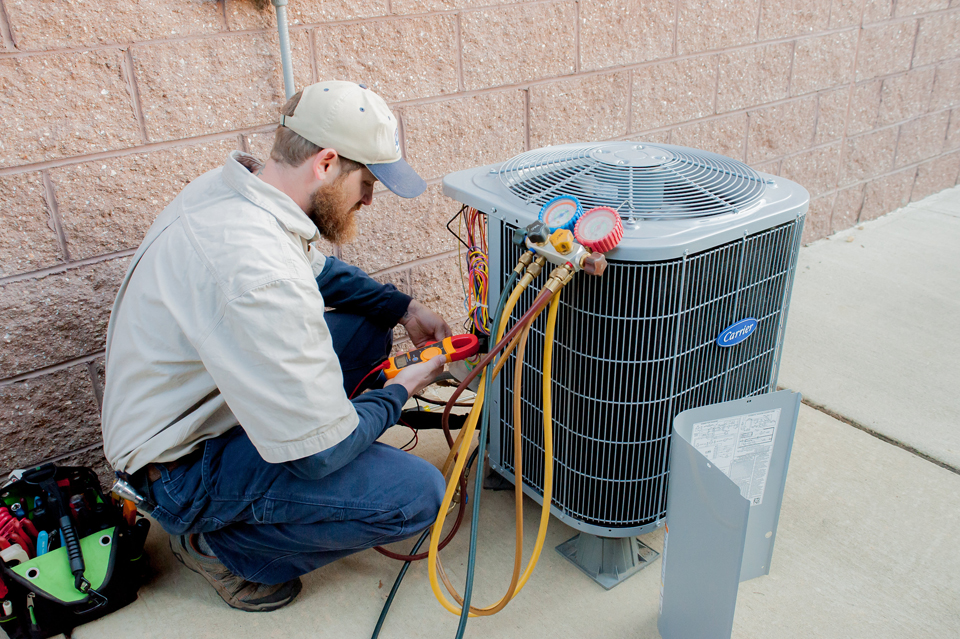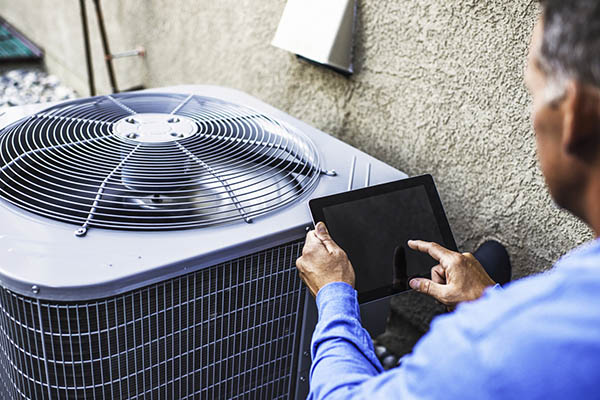Essential Tips to Planning a furnace replacement
Essential Tips to Planning a furnace replacement
Blog Article
Picking Between a Warmth Pump and Furnace: Trick Considerations for Your Heating And Cooling Demands
When assessing home heating options for heating and cooling requires, the decision between a heatpump and a furnace can be complicated. Each system offers distinctive benefits tailored to details climates and power performance goals. Comprehending these differences is vital for making an informed selection. Secret factors such as installment costs and ecological impact better complicate the option process. Which alternative genuinely aligns with one's convenience and sustainability preferences? The complying with sections will discover these considerations carefully.
Understanding Warmth Pumps: How They Function and Their Advantages
While several property owners think about numerous home heating options, understanding how warm pumps feature and their benefits can significantly affect their choice. Heatpump run by transferring warmth instead of generating it. In the wintertime, they remove warm from the outdoors air or ground and transfer it inside your home, while in the summertime, they reverse this process, cooling the home by getting rid of warmth outside. This double capability makes them flexible for year-round environment control.One of the primary benefits of warmth pumps is their power effectiveness. They use substantially much less electrical power contrasted to typical furnace, possibly causing lower utility bills (heat pump replacement ooltewah tn). Additionally, warm pumps have a smaller carbon impact, making them an eco-friendly choice. They likewise call for much less maintenance than standard systems, contributing to long-term price financial savings. In general, comprehending the mechanics and benefits of heatpump can help property owners make notified choices concerning their heating and cooling down demands
Checking Out Heating Systems: Types, Operation, and Advantages
Heating systems can be found in different types, consisting of gas, electrical, and oil versions, each with unique functional systems. Understanding these distinctions is important, as they impact efficiency and home heating performance. Additionally, heaters supply numerous benefits, such as regular warmth result and integrity in cooler environments.
Kinds of Heaters
Home heating systems can vary significantly in design and operation, with furnaces being a prominent choice amongst house owners. There are several kinds of heaters, each making use of different gas resources and innovations. Gas furnaces prevail, leveraging natural gas to generate warm efficiently. Electric heaters, on the various other hand, utilize electrical resistance to create heat, frequently preferred for their uncomplicated installment. Oil heaters, while less typical, work in areas with restricted gas accessibility (ductless mini splits). Furthermore, condensing heaters make the most of power performance by catching and reusing exhaust gases. Each type runs via a system of warmth exchangers and ductwork to distribute cozy air throughout a home. Recognizing the differences in between these furnace kinds is necessary for informed a/c choices
Advantages of Furnaces
For house owners seeking trustworthy heat during chilly months, the benefits of heaters are significant. Heating systems give consistent heating, guaranteeing also temperature levels throughout the home. They are specifically effective in severe cold, commonly outmatching heatpump in cold problems. Various kinds, consisting of gas, electrical, and oil heating systems, use adaptability to fulfill diverse requirements and preferences.Furnaces likewise have a tendency to have reduced first installment prices compared to warmth pumps, making them a more available alternative for lots of. Their durable layout contributes to a longer life expectancy, with numerous systems lasting over 15 years with proper maintenance. Additionally, modern heaters are often equipped with innovative modern technology for boosted effectiveness, which can result in decreased energy expenses. In general, furnaces remain a reliable option for effective home heating.

Power Performance: Contrasting Warmth Pumps and Furnaces
When comparing power efficiency between heatpump and heating systems, the Seasonal Energy Efficiency Ratio (SEER) plays a crucial duty in determining performance. In addition, an operational cost analysis discloses the long-term economic implications of each system. Recognizing these elements can guide homeowners in making educated choices about their home heating solutions.
Seasonal Power Performance Proportion
Energy efficiency plays a necessary duty in the decision-making procedure in between warmth pumps and furnaces, particularly when considering the Seasonal Energy Efficiency Ratio (SEER) This statistics measures the cooling efficiency of heat pumps over a whole air conditioning period, giving a standard means to review efficiency. Higher SEER rankings indicate higher power effectiveness, converting to lower power intake and minimized utility bills. On the other hand, heaters are normally assessed utilizing the Yearly Fuel Use Efficiency (AFUE) score, which mirrors home heating efficiency. When comparing these 2 systems, house owners ought to prioritize SEER rankings for heatpump, as they straight impact overall energy savings and environmental sustainability. A complete understanding of SEER can especially influence the long-term contentment and cost-effectiveness of the selected heating and cooling solution.
Functional Cost Evaluation
Understanding the functional costs associated with heat pumps and heaters is crucial for property owners reviewing their choices. Heat pumps commonly use higher energy performance, converting electrical energy right into heat with marginal waste. This leads to lower regular monthly utility bills, particularly in moderate climates. Conversely, conventional heating systems, especially gas designs, may have lower in advance prices but can sustain greater operational costs with time as a result of fuel costs and effectiveness ratings.Moreover, warmth pumps can work as both heating and cooling down systems, possibly lowering the need for different HVAC systems. While preliminary financial investments for heat pumps may be greater, their lasting financial savings in energy efficiency can make them a much more cost-effective choice for lots of houses. Careful analysis of local energy rates is important to determine the most effective choice.
Installment Prices: What to Expect for each and every Furnace
Setup expenses for furnace can differ considerably in between heatpump and heating systems, influencing house owners' choices. Heatpump usually have greater ahead of time setup expenses, normally varying from $3,500 to $8,000, depending upon the system size and intricacy of installment. This consists of the outside unit, indoor handling system, and essential ductwork modifications. On the other hand, click to find out more furnaces have a tendency to have lower first prices, balancing between $2,500 and $6,000, which can be appealing for budget-conscious home owners. Installation expenditures can raise if substantial ductwork is required.Moreover, the option of fuel kind for heaters-- natural gas, lp, or electric-- can likewise influence installment costs. While heatpump provide power effectiveness, their initial financial investment may deter some customers. Eventually, evaluating installment costs together with long-term financial savings and efficiency will certainly help homeowners in making educated decisions concerning their heater.
Climate Considerations: Which System Executes Better in Your Location
How do environment conditions influence the performance of heater? The efficiency of heatpump and heaters can vary considerably depending on the regional environment. In modest climates, warmth pumps excel by effectively moving heat from the outside air, making them an energy-saving alternative. However, their effectiveness lessens in incredibly chilly temperature levels, where they may have a hard time to draw out sufficient heat. Conversely, heating systems, especially gas versions, provide reputable and regular warmth no matter of exterior problems, making them preferable in colder regions.In locations that experience milder winters, heatpump can run efficiently year-round, giving both home heating and cooling. On the other hand, areas with rough winters typically take advantage of the effectiveness of heaters. Inevitably, recognizing the neighborhood environment is crucial when deciding in between a warmth pump and a heater, as it straight impacts their operational efficiency and overall efficiency.
Maintenance Requirements: Long-Term Treatment for Warm Pumps vs. Furnaces
While both heatpump and heaters need regular upkeep to guarantee peak performance, their particular requirements and treatment routines vary considerably. Heaters normally need much less frequent focus, with annual examinations sufficing to check for gas leakages, tidy filters, and evaluate total performance. Their easier design typically allows for straightforward repairs.In comparison, heatpump demand biannual upkeep due to their double duty in cooling and heating. This consists of cleaning coils, inspecting cooling agent levels, and making sure that both the interior and outdoor units work at their ideal. Additionally, heatpump maintenance commonly involves more elaborate parts, making professional maintenance essential.Neglecting maintenance can lead to lessened effectiveness and enhanced power expenses for both systems. Ultimately, homeowners ought to think about these lasting treatment requirements when choosing between a warm Our site pump and a heating system, as positive upkeep can expand the life-span and efficiency of either system substantially.
Environmental Impact: Choosing a Sustainable Heating Option
The environmental influence of home heating systems is an important examination for house owners looking for lasting alternatives. Heatpump are generally more energy-efficient than traditional furnaces, as they transfer warmth instead of create it, substantially lowering carbon exhausts. By making use of renewable resource sources, such as geothermal or air-source warm pumps, property owners can even more lessen their ecological footprint.On the various other hand, gas heating systems give off greenhouse gases and contribute to air contamination, though they usually give greater heat outcome. Nonetheless, advancements in technology have caused the growth of high-efficiency heaters that lessen emissions.Ultimately, selecting a heater includes weighing performance versus environmental effect. Property owners are urged to mirror on regional energy resources and incentives for sustainable systems, ensuring a selection that aligns with both individual comfort and environmental duty. The decision influences not only immediate convenience yet additionally lasting sustainability and ecological wellness.
Often Asked Concerns
How Much Time Do Heat Pumps and Furnaces Commonly Last?
The lifespan of warmth pumps Web Site generally varies from 15 to two decades, while heating systems can last in between 15 to three decades. Routine maintenance substantially impacts their durability and efficiency in giving home heating solutions.
Can I Utilize a Heatpump in Extremely Cold Climates?
Warm pumps can run in exceptionally cold climates, but their effectiveness lessens as temperature levels decrease. In such problems, supplemental heating sources may be needed to preserve comfortable indoor temperatures and ensure peak performance.

What Is the Sound Degree of Heat Pumps Versus Furnaces?
The sound degrees of heatpump and heaters vary considerably. Normally, heatpump run more silently than conventional heaters, making them more effective for those sensitive to seem, while furnaces might produce louder functional sounds during home heating cycles.
Are Heat Pumps Suitable for Both Cooling And Heating?
Warm pumps are undoubtedly appropriate for both heating and air conditioning (heat pump installation ooltewah tn). They operate by moving warm, providing effective temperature level control year-round, making them a versatile selection for property owners looking for an all-in-one HVAC option
What Dimension Furnace Do I Need for My Home?
Figuring out the appropriate size heating unit for a home calls for assessing aspects such as square footage, insulation quality, regional climate, and the home's design. Consulting an expert can guarantee a precise evaluation and ideal comfort. Warm pumps commonly offer higher energy effectiveness, transforming electric energy right into warmth with marginal waste. In moderate climates, heat pumps excel by effectively transferring warm from the outside air, making them an energy-saving choice. Alternatively, heaters, particularly gas models, provide regular and reliable warm no matter of outdoor conditions, making them better in chillier regions.In areas that experience milder wintertimes, warmth pumps can operate efficiently year-round, offering both heating and cooling. Heat pumps are generally extra energy-efficient than typical heaters, as they move warm rather than generate it, substantially lowering carbon discharges. By using renewable energy resources, such as air-source or geothermal heat pumps, house owners can even more lessen their eco-friendly footprint.On the other hand, natural gas heaters emit greenhouse gases and add to air contamination, though they typically offer higher warmth outcome.
Report this page